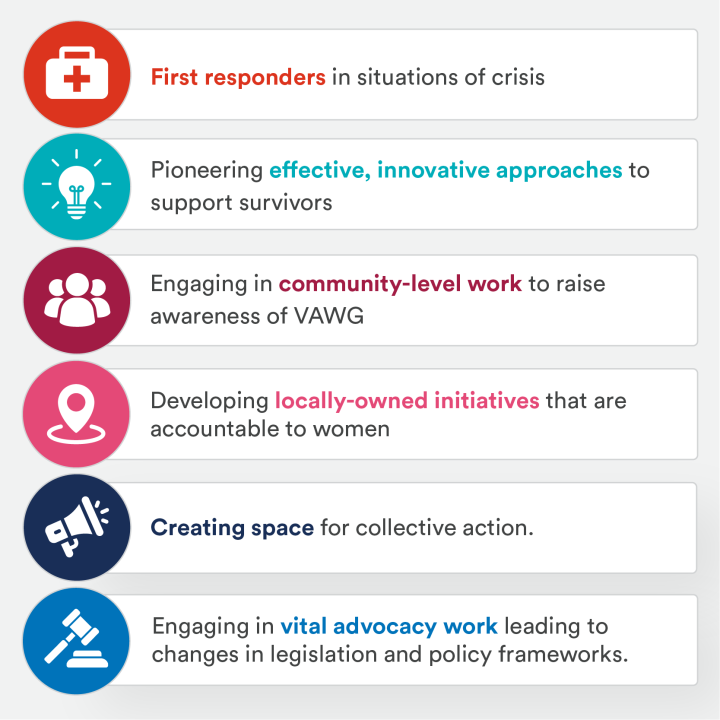Fund and support Women’s Rights Organisations

Fund and support Women’s Rights Organisations
Case Studies
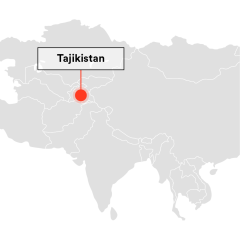
The Spotlight Initiative programme in Tajikistan offered creative training and mentorship to various WROs and other CSOs through a simulation exercise. This exercise involved CSOs participating in a workshop where their proposals were evaluated by Recipient UN Organisations (RUNOs). A mock evaluation committee then provided feedback on the proposals.
As a result of participating in this training exercise, WROs had an improved understanding of Spotlight Initiative processes and requirements, which resulted in an increased number of proposal submissions from WROs in Tajikistan to the Central Asian Regional Programme.


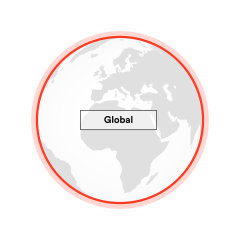
In December 2021, Spotlight Initiative launched the WithHer Fund in partnership with the UN Foundation to provide flexible financial support to smaller, local, grassroots and WROs working to end violence against women and girls in their communities.
The fund operates under feminist grant-making principles, focusing on flexibility, trust and transparency. To overcome common funding barriers faced by small organisations, the WithHer Fund uses a simplified application and reporting process.
The first cohort of WithHer Fund grantees was chosen based on specific criteria, including the urgency of resourcing needs and their track record in addressing violence against women and girls, particularly in the workplace. The selected organisations represented a regional spread, including:
- Argentina: Sordas sin Violencia (Deaf Women Without Violence Programme) provides accessible information and support to deaf and hard-of-hearing women and their children who are experiencing violence and discrimination.
- Belize: Haven House provide shelter and temporary relief for women and their children experiencing domestic violence.
- El Salvador: CEMUJER is a feminist human rights institution dedicated to strengthening the rule of law and access to justice for women.
- Malawi: Foundation for Civic Education and Social Empowerment (FOCESE) work with young survivors of child marriage and violence.
- Mali: ONG Tagne works on GBV, female genital mutilation and forced/early marriage.
- Trinidad and Tobago: NiNa Young Women’s Leadership Program works to help girls and young women in the state care system develop coping skills to manage past sexual abuse, neglect and emotional trauma.
Seed funding for the first grantees, totalling USD 180,000 at the end of 2021, was made possible by initial support from the UN Foundation and two private sector foundations (The Estée Lauder Companies Charitable Foundation and the H&M Foundation).


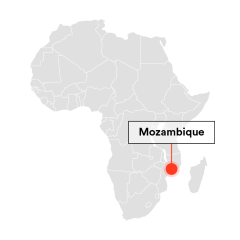
The Spotlight Initiative programme in Mozambique provided training and ongoing capacity development sessions for 50 WROs. The WROs were identified through a mapping of organisations and then invited to a 3-day training session in advocacy, influencing, programme design, monitoring and evaluation and knowledge management. Opportunities were provided in these sessions for networking and sharing experiences. Special attention was given to organisations representing the interests of marginalised groups, such as people living with HIV, people with disabilities and rural women. WROs received ongoing coaching from the implementing partner, Forum Mulher, the national convener NGO for feminist movements.
"We want to empower women. We want to end GBV. Spotlight Initiative cannot stop; we must continue reaching all girls and women in vulnerable situations" - Felismina Dengo, Gender Links focal point (OSC), Nampula.
As a result, the Mozambique Final Report observes that the number of WROs, social movements, and CSOs with increased capacity for influence and agency to work towards ending sexual and gender-based violence is 175 (against a target of 20). The capacity building has helped recognise the importance of WROs as agents of change to lobby and advocate for stronger laws and policies, to mobilise people to challenge unequal social norms, and to connect survivors of violence to essential services.


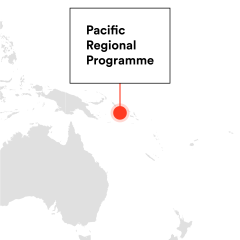
Under Pillar 6, the Spotlight Initiative Pacific Regional Programme aims to support WROs through the small grants funding mechanism. The small grants, ranging from USD 2,500 to USD 50,000, have a simplified application process, with fewer steps than other funding mechanisms.
A series of virtual town halls were held to prepare potential applications and provide an overview of the requirements, guidelines in the development of proposals and budgets, and reporting and monitoring and evaluation requirements. Further support was provided via email or phone, with the aim of reducing any bureaucratic hurdles to applying for and reporting on grants, especially for young or small WROs.
For each small grant, there is a strong support system. This includes mentoring, both in-person and remotely, one-on-one technical help, and resources to help organisations connect, learn from each other, and plan strategically.
In the first round, eight organisations received grants, which they used to adapt services and prevention messaging on VAWG to reach remote areas during the COVID-19 pandemic. Another organisation used the funds to assess how it can improve its safe services and referrals to LGBTQI+ survivors of violence, which is expected to bring lasting changes to how it provides services.



